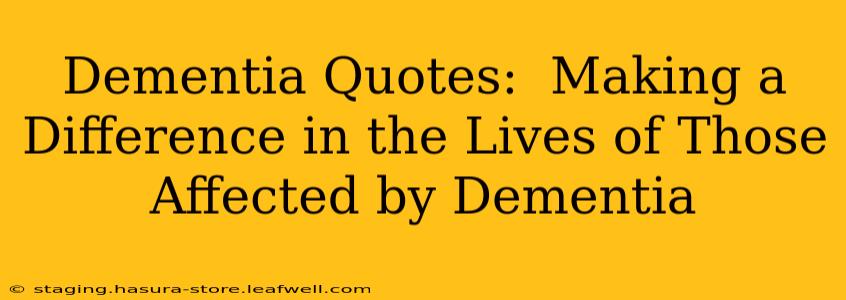Dementia, an umbrella term encompassing a range of progressive neurological disorders, affects millions worldwide. It's a condition that profoundly impacts not only the individual diagnosed but also their families and caregivers. While there's no cure, understanding, compassion, and proactive support can significantly improve the quality of life for those living with dementia. This article explores the impact of dementia through poignant quotes, addresses common questions, and offers insights into how we can all make a difference.
What are some of the most impactful quotes about dementia?
Impactful quotes often encapsulate the emotional and practical realities of living with and caring for someone with dementia. While a comprehensive list is impossible, here are a few examples that highlight different aspects of the condition:
- "Dementia is not just a disease; it's a thief, stealing memories, personalities, and ultimately, the person you love." This quote powerfully captures the devastating loss experienced by families.
- "It's not about what's lost, but what remains. Focus on the moments of joy, connection, and love." This offers a more hopeful perspective, emphasizing the importance of cherishing what endures.
- "Patience is a virtue, especially when caring for someone with dementia." This simple quote highlights the crucial role of patience in providing compassionate care.
- "Dementia may take away memories, but it cannot take away love." This quote speaks to the enduring power of love in the face of profound cognitive decline.
These quotes, although brief, illustrate the depth of emotion and challenge associated with dementia. They highlight the need for understanding, empathy, and supportive resources.
What is the most common type of dementia?
Alzheimer's disease is the most common type of dementia. It accounts for 60-80% of cases. Other forms include vascular dementia, Lewy body dementia, frontotemporal dementia, and mixed dementia (a combination of types). Each type has its unique symptoms and progression, emphasizing the importance of accurate diagnosis.
What are the early signs of dementia?
Early detection is crucial for managing dementia and improving quality of life. Early signs can be subtle and often dismissed, but they can include:
- Memory loss that affects daily life: Forgetting recent conversations, appointments, or events.
- Difficulty performing familiar tasks: Struggling with everyday activities like cooking, driving, or managing finances.
- Problems with language: Difficulty finding the right words, understanding conversations, or following instructions.
- Disorientation to time and place: Getting lost in familiar surroundings or confusing dates and times.
- Changes in judgment or decision-making: Making impulsive or poor decisions.
- Changes in mood or personality: Becoming more withdrawn, anxious, depressed, or agitated.
- Loss of initiative or motivation: Lacking the drive to engage in previously enjoyed activities.
If you notice these symptoms in yourself or a loved one, seeking professional medical evaluation is essential.
How can I help someone with dementia?
Providing support to individuals with dementia requires patience, understanding, and a willingness to adapt. Here are some key strategies:
- Maintain a calm and supportive environment: Reduce stress and anxiety through a predictable routine and a calming atmosphere.
- Communicate clearly and simply: Use short, simple sentences and avoid abstract language.
- Engage in meaningful activities: Encourage participation in activities that stimulate the senses and bring joy.
- Offer physical support and assistance: Help with daily tasks as needed.
- Practice patience and understanding: Remember that behavioral changes are often a symptom of the disease.
- Seek support for yourself: Caregiving can be challenging; connect with support groups or seek professional assistance.
What resources are available for people with dementia and their families?
Numerous organizations offer support, resources, and information about dementia. These resources vary by location but generally include:
- Support groups: Connecting with other caregivers provides valuable emotional support and practical advice.
- Educational materials: Many organizations offer brochures, websites, and workshops to educate caregivers and families.
- Respite care: Provides temporary relief for caregivers, allowing them time for themselves.
- Medical professionals: Neurologists, geriatricians, and other specialists provide medical care and guidance.
Remember, you're not alone in facing the challenges of dementia. Seek out the support you need to navigate this journey with grace and compassion. The quotes above, while highlighting the difficulties, also emphasize the enduring power of love, connection, and the importance of making a difference in the lives of those affected.

